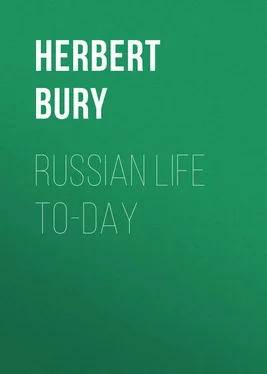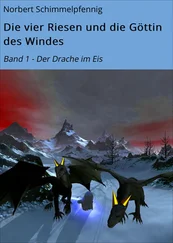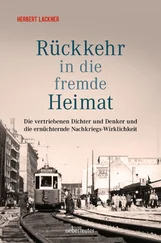Herbert Bury - Russian Life To-day
Здесь есть возможность читать онлайн «Herbert Bury - Russian Life To-day» — ознакомительный отрывок электронной книги совершенно бесплатно, а после прочтения отрывка купить полную версию. В некоторых случаях можно слушать аудио, скачать через торрент в формате fb2 и присутствует краткое содержание. ISBN: , Жанр: foreign_antique, foreign_prose, на английском языке. Описание произведения, (предисловие) а так же отзывы посетителей доступны на портале библиотеки ЛибКат.
- Название:Russian Life To-day
- Автор:
- Жанр:
- Год:неизвестен
- ISBN:http://www.gutenberg.org/ebooks/33303
- Рейтинг книги:5 / 5. Голосов: 1
-
Избранное:Добавить в избранное
- Отзывы:
-
Ваша оценка:
- 100
- 1
- 2
- 3
- 4
- 5
Russian Life To-day: краткое содержание, описание и аннотация
Предлагаем к чтению аннотацию, описание, краткое содержание или предисловие (зависит от того, что написал сам автор книги «Russian Life To-day»). Если вы не нашли необходимую информацию о книге — напишите в комментариях, мы постараемся отыскать её.
Russian Life To-day — читать онлайн ознакомительный отрывок
Ниже представлен текст книги, разбитый по страницам. Система сохранения места последней прочитанной страницы, позволяет с удобством читать онлайн бесплатно книгу «Russian Life To-day», без необходимости каждый раз заново искать на чём Вы остановились. Поставьте закладку, и сможете в любой момент перейти на страницу, на которой закончили чтение.
Интервал:
Закладка:
There is a great freedom of movement everywhere in Russia, and I do not remember having seen the word verboten (the German for “forbidden”), or its equivalent, in any part of a Russian or Siberian station. The rule of having three bells to announce approaching departure is a most excellent one, whether the pause is long or short, the first ringing very audibly about five minutes, the second one minute, and the third immediately before departure. If travelling long distances, the ten-minutes’ stop at all large towns gives plenty of opportunity for exercise and fresh air, and the absolute certainty of hearing the bells gives a perfect sense of security that no one will be left behind. If the bell rings twice just as the train enters the station, every one knows that the stay will be short, and that it is not worth while getting out.
Some of the most resting and refreshing experiences I have ever had have been those of travelling day after day for some two or three thousand miles in Russia, getting one’s correspondence straight, for writing is quite easy in those steady and slow-moving express trains, reading up reviews and periodicals or making plans for future journeys, looking out of the windows in the early morning or late evening, all varied by meals in the coupé or at a station, seeing all kinds of interesting people in strange costumes, and many attractive incidents at places where one alights for a walk and exercise.
More interesting than the railways, however, are the rivers. How large these are, and how important a part they have filled in the past, before the days of railways, and still play in the commerce and life of the people, will be seen at once by a glance at the map at the end of the book. None of them, however, though one gets a real affection for the Neva after sledging over it in the winter and sailing upon it in the summer, attracts and indeed fascinates, as the Volga never fails to do. It is magnificent in size, and is the largest in Europe, 2,305 miles in length, three times as long as the Rhine. Many of us know what the Rhine is to the Germans. Treitschke, as we have been reminded in one of the most widely read of modern books, when leaving Bonn, wrote to a friend, “To-morrow I shall see the Rhine for the last time. The memory of that noble river will keep my heart pure, and save me from sad and evil thoughts throughout all the days of my life.”
I have always understood the strong appeal to the historic, and even the poetic, sense which the Rhine puts forth, but I never understood the sense of the ideal which a river might convey until I saw, approached, and crossed the Volga.
It was a May evening, three years ago, as we drew near and then passed along its right bank before crossing. It was of the loveliest colour of rich and living brown, like that of a healthy human skin, carrying life and burdens of every description upon its ample bosom, fostering all kinds of enterprise and activity on its shores, and flowing on with stately dignity, as if it would not be hurried from its calm consciousness of its own strength and significance for those nine provinces through which it passes on its way to the Caspian. I felt its spell at once, and, as I crossed the great bridge over which the Trans-Siberian line is carried – an exquisite piece of engineering a mile and a quarter in length – I knew that I should always feel a curious sense of personality in connection with that glorious river. I think Merriman, in one of his novels, speaks of associating a sense of consciousness with the Volga; and that is just what I have felt each time of crossing over its bounteous-looking, calm, and steady flow. It seems to live and know.
The third and last “difficulty” which I will speak of in this opening chapter, and which is no difficulty at all, is the passport. Every one in Russia must possess one; and, if travelling and intending to spend one or two nights in a place, it must be sent to the proper official and be duly stamped. It must be visèd by the Russian ambassador, or minister, at the place from which one starts before entering Russia; and, which is even more important, it must be visèd by the right official at some important town or place of government, and stamped with the necessary permission, before one is able to leave Russia.
It is natural to feel at the frontier, when entering the country, “I hope it is all right,” as the passport is handed to the customs officer, and, with just a little approach to anxious uncertainty, after all one has heard and read; but it is almost impossible to avoid real anxiety that it will be found correct and in order as it is presented at the frontier when leaving , as the difficulties of being kept back there, so far away from the great cities, would be far greater than those of being refused admission from some technicality that could probably be put right by a telegram to and from England.
“But surely the passport must prevent you from feeling that sense of freedom that you have spoken of more than once – surely that must give a sense of repression and suspicion and being watched and having an eye kept on your doings,” my reader will be thinking, and perhaps many other people have the same feeling. It is, however, exactly the opposite with me, for my passport in Russia and Siberia is a great stand-by, and gives me a great sense of being always able to establish my own identity.
There can be little doubt that the passport was established from the first in the interests of the community, for it is entirely in their own interests that people should possess them. No one who is honest in purpose can have any difficulty in procuring one or be brought to any trouble through it. The necessity of frequently producing them, in moving from place to place, is always in the interests of the traveller in a vast empire like Russia. It has given me a great feeling of confidence in launching out, as has been necessary now and then, into the unknown, to feel “They will be able to trace me all along by the entries made in official registers, as the passport has been stamped.” If any one disappeared in Russia the police would be able to trace his movements to very near the place of disappearance.
It is a great help in getting letters also to have a passport, for we are just as anxious as the officials can be that our letters should not go to the wrong people; and in travelling in out-of-the-way places it is simply invaluable in getting the help, advice, and recognition that sometimes are so very necessary. Even the passport, therefore, helps to deepen the sense of security and freedom with which one launches out into Russian travel, anxious to gain all that it has to give in information and stimulating experience.
It will be remembered, however, that I speak always not as a resident, but as a traveller; and there is just this difference — indeed, it is a vast difference – between my own opportunities and those of an ordinary traveller. Travelling as the bishop for the English Church work in Russia, in every place our clergy and residents have only been too happy to speak of their own experiences and impressions, some of them lifelong and all-important. When travelling in Siberia, and the guest from time to time of managers of the great mines, I go out with them day after day and get long conversations with them, their wives, and members of the staff. I hear all about early struggles, hopes and fears, difficulties and triumphs extending over many years. The conditions of life and characteristics of the people in vast tracts of country are described to me by those who know them well. No one but a bishop travelling through the country would have the same information so freely volunteered to him. And it is this which has led me to feel that I might, without undue presumption, write for ordinary readers about the life of a country in which I have not, as yet, spent a great many years.
Читать дальшеИнтервал:
Закладка:
Похожие книги на «Russian Life To-day»
Представляем Вашему вниманию похожие книги на «Russian Life To-day» списком для выбора. Мы отобрали схожую по названию и смыслу литературу в надежде предоставить читателям больше вариантов отыскать новые, интересные, ещё непрочитанные произведения.
Обсуждение, отзывы о книге «Russian Life To-day» и просто собственные мнения читателей. Оставьте ваши комментарии, напишите, что Вы думаете о произведении, его смысле или главных героях. Укажите что конкретно понравилось, а что нет, и почему Вы так считаете.












